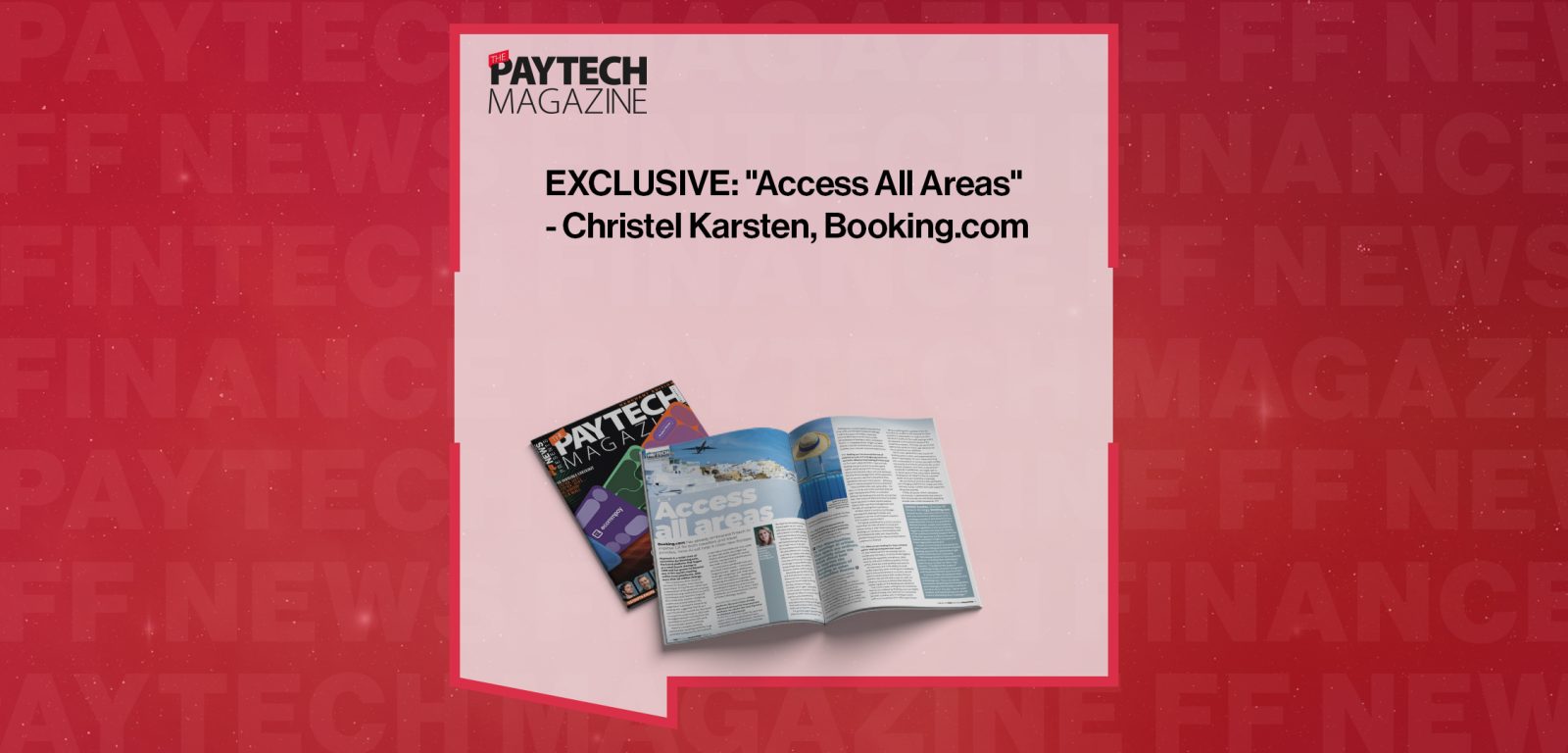Breaking News

EXCLUSIVE: “Access All Areas” – Christel Karsten, Booking.com in ‘The Paytech Magazine’
Booking.com has already embraced fintech to improve CX for both travellers and travel providers. Now AI will help it cross new frontiers
Payments is a major area of innovation for Booking.com, the travel platform that began as a small Dutch startup in 1996 and has grown to become one of the world’s leading online travel platforms, with more than 29 million listings.
The company has been ahead of the curve for decades, most recently launching an AI Trip Planner, which uses a combination of the platform’s existing machine-learning models (such as GenAI Orchestrator) and OpenAI’s ChatGPT API, to help with research, analysing reviews and provide tailored trip suggestions.
Subsequent research by Booking.com suggested that 41 per cent of consumers overall are interested in using AI to curate trips in 2025 with the biggest demand coming from the neurodiverse community who tend to want to plan details carefully. Travel is a complex booking environment, handling relatively large purchases (compared to, for example, a taxi ride or food delivery). And, unlike an Uber Eats order, you might not receive what you bought for several months, having made adjustments to the order in the interim.
As consumers worldwide seek out the latest travel trends – ‘noctourism’, ‘longevity trips’, ‘ageless adventures’, ‘multi-gen megatrips’ and ‘male-only vacations’ among them – Booking.com is making the platform experience ever-more personal and flexible, while providing transparency and security around transactions. To do that, it looks to fintechs, as Christel Karsten, Director of Fintech Strategy, explains.
THE PAYTECH MAGAZINE: Global platforms like yours have already addressed demand for local payment methods. So, what’s the next big trend in checkout experience?
CHRISTEL KARSTEN: Over the past few years, consumer expectations have expanded in two dimensions. The first is optionality in when and how they pay. The major buy now, pay later providers cleverly tapped into that need, but split-pay providers (which allow you to split a payment across different people or credit cards) are also growing in appeal. At Booking.com, we allow travellers with flexible bookings the choice to pay straight away or to pay when the booking becomes non-refundable.
This optionality has been received very positively by travellers, where we see big differences across geographies in what consumers tend to prefer. For example, on average, European travellers prefer to pay straight away, whereas North American travellers prefer to pay later. Optionality typically comes at the cost of simplicity (more options make the journey more complex as the consumer needs to weigh the choices).
But then the second thing that travellers seek is higher customisation in their check-out experience, where the options offered are adapted to their specific needs and preferences. So, in this way, customisation can keep optimisation simple by limiting the choices presented to what is relevant or preferred by a specific customer.
The growing usage of payment wallets plays into this, where consumers can load their preferred payment methods, but they present a simplified interface to the consumer.
TPM: How do you use payment data to improve the customer experience and how will you use AI to improve it in the future?
CK: One way is to leverage data for customisation, to determine (and frontload the experience onto) the most relevant options, based on a traveller’s payment history or the type of booking. An alternative is to leverage the data to provide access or insights that would otherwise be difficult to obtain. For instance, some travellers indicate they find it challenging to estimate a budget for their trip, or understand what they could do within a given budget.= With our data, we could make such estimates accessible in an easy, interactive manner.
Booking.com is embracing the potential that AI can offer and the opportunities to leverage it within this space are endless, especially when we think about how to improve the personalisation of lending or other embedded finance, i.e. using data-driven insights to tailor products, improve risk assessment, and create smoother, more relevant customer experiences.
“The opportunities to leverage AI within this space are endless, especially when we think about how to improve the personalisation of lending or other embedded finance”
TPM: Booking.com has assumed the role of a paytech in so far as it manages payments for merchants. What are they looking for from you?
CK: For travel supply providers, Payments by Booking.com gives access to a wider guest market, while helping them increase their revenue security and reduce risk and workload. Not only do we manage their online payments, but we can also help them streamline their operations and reach more guests – allowing them to unlock untapped business potential.
Travel providers also seek optionality – for them, it’s to do with when and how they are paid, especially when there is a window between the booking time and the actual stay date. Their choice of when and how to receive those payments is driven by the need to balance their cash flow management with the ease of running their operations.
Another theme is currency and foreign exchange (FX). Making FX simple and transparent are the most frequent requests from travellers and providers. The typical preference for a cross-currency transaction for both of them is to pay and receive money in their local currency. There, Booking.com can play an intermediary role to facilitate both sides and, importantly, provide transparency on rates and fees before a payment is initiated.
TPM: What are you looking for from a fintech partner when growing your tech stack?
CK: Any fintech partner we consider has to comply with the basics, in terms of the highest standards for regulatory compliance, data security, and service delivery quality. On top of that, there are a few qualities we look for. An important one is the ability to scale rapidly. Especially when working on a relatively new or innovative product or service, we are open to conversations with smaller fintech partners, but we will seek a partner with an infrastructure and processes that allow for scaling rapidly on the Booking.com platform.
Then there is their willingness to customise. Any services offered by Booking.com are highly catered towards the needs of our customers. We seek a partner who is willing to work with us to customise their offering to these.
We are working with a partner in the UK, for instance, to offer a cash advance to travel providers in that market. In order to do that we need it to ensure the credit scoring models are adapted to the seasonal nature of the hospitality industry. That way, we can provide appropriate access to these cash advances for the properties on our platform. Value chain optionality is also important.
Booking.com is a data- and experimentation driven organisation. As such, when venturing into a new product or service, we might initially rely heavily on a fintech partner for the service delivery. However, over time, as the product market fit is established, we might seek to in-source parts of that value chain, allowing Booking.com to adapt further to customer needs and build capabilities internally.
We seek fintech partners who are flexible to a changing collaboration model over time, and who remain collaborative and supportive along that journey.
Finally, of course, there’s attractive commercials. A partnership only works if the commercials are ultimately appealing to both sides of the transaction.
Christel Karsten, Director Of Fintech Strategy, Booking.com
Christel Karsten, who has a PhD in Finance and Law, started her professional career as a strategy consultant with Booz & Co (later acquired by PwC ) where she specialised in financial services, mainly advising banks and their regulators. It was here that she began to question the long-term viability of the traditional banking model in the face of the then growing number of innovative fintechs moving at a higher pace and with fewer legacy tech constraints.
A move to OLX Group (a marketplace for peer-to-peer selling) as its director of global strategy, gave her the opportunity to get up close to this dynamic new sector.
“OLX Group started to explore financial products, including intermediating car loans for peer-to-peer car sales,” says Karsten. “I recognised the power of combining a large consumer-facing brand with financial products at point of sale.”
In January 2022, she joined the then barely six-month-old Fintech Business Unit at Booking.com.
“Here, my role has focussed on identifying financial questions and challenges that travellers and travel providers face,” she says, “and to assess whether and how Booking.com can play a role in alleviating those challenges.”
This article was published in The Paytech Magazine Issue 16, Page 8-9
People In This Post
Companies In This Post
- FF Tattoo Studio: Fenergo on Native ID&V and the Fight Against FinCrime Read more
- Generative AI in Banking: From POCs to Front-Office Impact Read more
- EXCLUSIVE: “Chain Reaction” – Sergey Nazarov and Fernando Vazquez, Chainlink in ‘The Paytech Magazine’ Read more
- FF Tattoo Studio: Datavillage on Privacy-First Data Collaboration and Faster Fraud Investigations Read more
- Chancellor Unveils Plans to “Supercharge” Growth of Innovative Financial Services Firms Read more


















